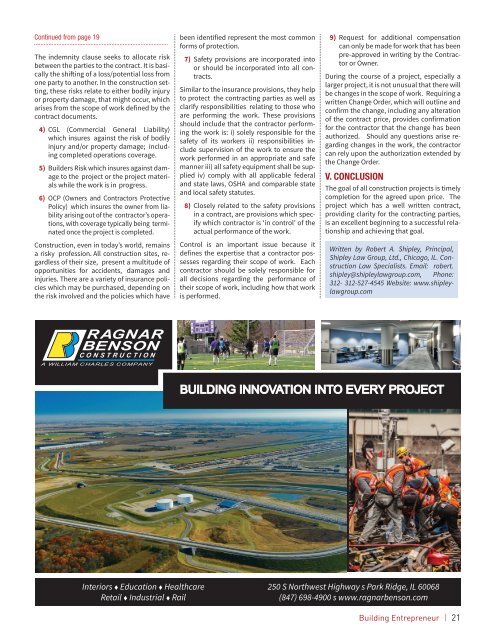Building_Entrepreneur_to print
You also want an ePaper? Increase the reach of your titles
YUMPU automatically turns print PDFs into web optimized ePapers that Google loves.
Continued from page 19<br />
The indemnity clause seeks <strong>to</strong> allocate risk<br />
between the parties <strong>to</strong> the contract. It is basically<br />
the shifting of a loss/potential loss from<br />
one party <strong>to</strong> another. In the construction setting,<br />
these risks relate <strong>to</strong> either bodily injury<br />
or property damage, that might occur, which<br />
arises from the scope of work defined by the<br />
contract documents.<br />
4) CGL (Commercial General Liability)<br />
which insures against the risk of bodily<br />
injury and/or property damage; including<br />
completed operations coverage.<br />
5) Builders Risk which insures against damage<br />
<strong>to</strong> the project or the project materials<br />
while the work is in progress.<br />
6) OCP (Owners and Contrac<strong>to</strong>rs Protective<br />
Policy) which insures the owner from liability<br />
arising out of the contrac<strong>to</strong>r’s operations,<br />
with coverage typically being terminated<br />
once the project is completed.<br />
Construction, even in <strong>to</strong>day’s world, remains<br />
a risky profession. All construction sites, regardless<br />
of their size, present a multitude of<br />
opportunities for accidents, damages and<br />
injuries. There are a variety of insurance policies<br />
which may be purchased, depending on<br />
the risk involved and the policies which have<br />
been identified represent the most common<br />
forms of protection.<br />
7) Safety provisions are incorporated in<strong>to</strong><br />
or should be incorporated in<strong>to</strong> all contracts.<br />
Similar <strong>to</strong> the insurance provisions, they help<br />
<strong>to</strong> protect the contracting parties as well as<br />
clarify responsibilities relating <strong>to</strong> those who<br />
are performing the work. These provisions<br />
should include that the contrac<strong>to</strong>r performing<br />
the work is: i) solely responsible for the<br />
safety of its workers ii) responsibilities include<br />
supervision of the work <strong>to</strong> ensure the<br />
work performed in an appropriate and safe<br />
manner iii) all safety equipment shall be supplied<br />
iv) comply with all applicable federal<br />
and state laws, OSHA and comparable state<br />
and local safety statutes.<br />
8) Closely related <strong>to</strong> the safety provisions<br />
in a contract, are provisions which specify<br />
which contrac<strong>to</strong>r is ‘in control’ of the<br />
actual performance of the work.<br />
Control is an important issue because it<br />
defines the expertise that a contrac<strong>to</strong>r possesses<br />
regarding their scope of work. Each<br />
contrac<strong>to</strong>r should be solely responsible for<br />
all decisions regarding the performance of<br />
their scope of work, including how that work<br />
is performed.<br />
9) Request for additional compensation<br />
can only be made for work that has been<br />
pre-approved in writing by the Contrac<strong>to</strong>r<br />
or Owner.<br />
During the course of a project, especially a<br />
larger project, it is not unusual that there will<br />
be changes in the scope of work. Requiring a<br />
written Change Order, which will outline and<br />
confirm the change, including any alteration<br />
of the contract price, provides confirmation<br />
for the contrac<strong>to</strong>r that the change has been<br />
authorized. Should any questions arise regarding<br />
changes in the work, the contrac<strong>to</strong>r<br />
can rely upon the authorization extended by<br />
the Change Order.<br />
V. CONCLUSION<br />
The goal of all construction projects is timely<br />
completion for the agreed upon price. The<br />
project which has a well written contract,<br />
providing clarity for the contracting parties,<br />
is an excellent beginning <strong>to</strong> a successful relationship<br />
and achieving that goal.<br />
Written by Robert A. Shipley, Principal,<br />
Shipley Law Group, Ltd., Chicago, IL. Construction<br />
Law Specialists. Email: robert.<br />
shipley@shipleylawgroup.com, Phone:<br />
312- 312-527-4545 Website: www.shipleylawgroup.com<br />
BUILDING INNOVATION INTO EVERY PROJECT<br />
Interiors t Education t Healthcare<br />
Retail t Industrial t Rail<br />
250 250 S S Northwest Highway s Park Ridge, IL IL 60068<br />
(847) 698-4900 s www.ragnarbenson.com<br />
<strong>Building</strong> <strong>Entrepreneur</strong> | 21







